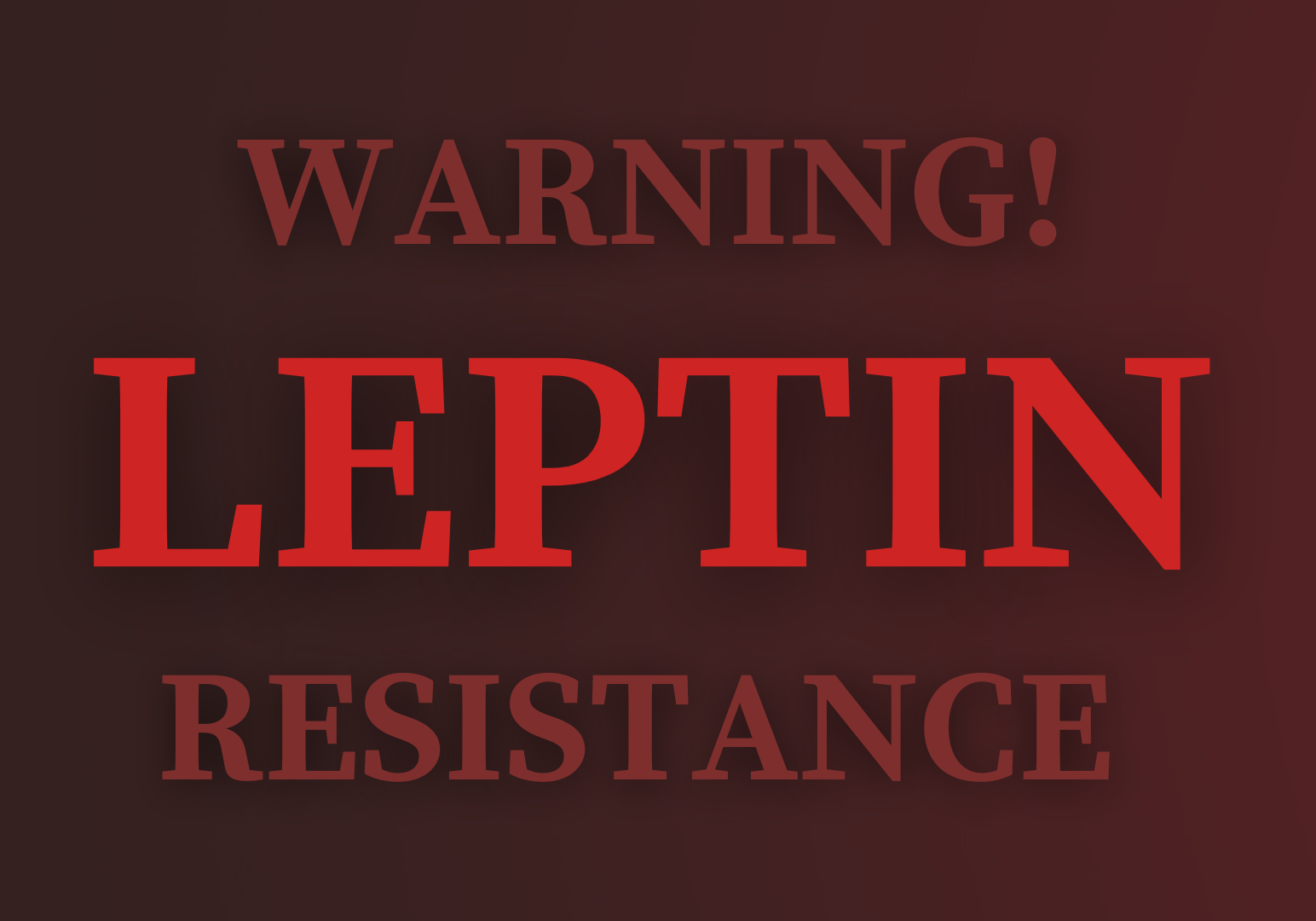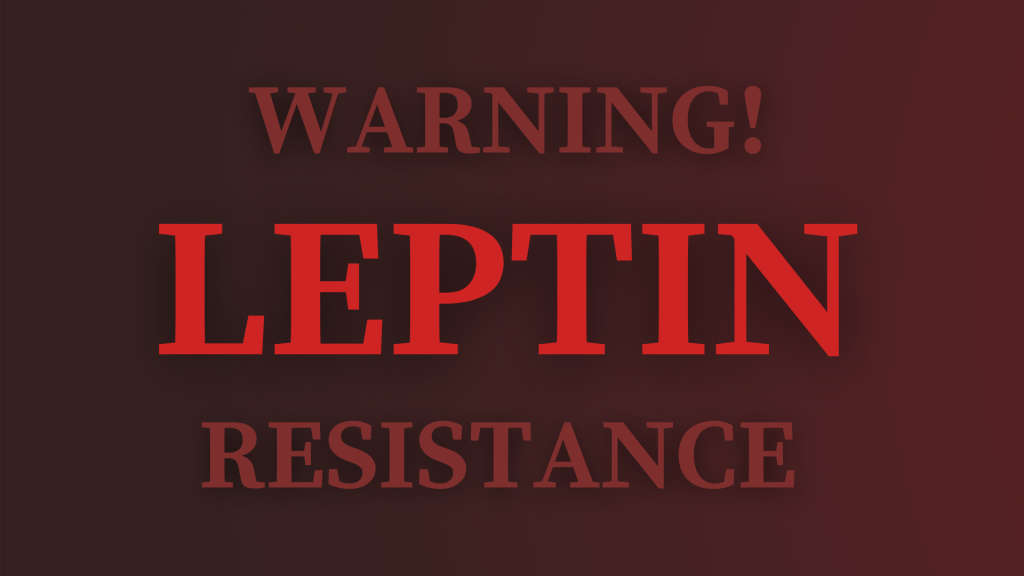Understanding And Overcoming Leptin Resistance

In this article, we’ll explain leptin resistance, how it happens, and how to reverse it with diet, lifestyle, supplements, and more.

Do you ever have difficulty managing your hunger and desire to eat even when you know you shouldn’t? If your answer is yes (or even if it’s no), you must understand what leptin is and how it can affect your fat loss goals.
Leptin is a hormone from your fat cells. It tells your body that enough fuel is stored, reduces hunger, and increases metabolism.
The story with leptin, however, is not straightforward, as excess body fat can lead to leptin resistance. It’s when your body becomes less responsive to the hormone signal, so you’re still ravenous despite having high leptin. Other factors can also contribute to leptin resistance, and leptin resistance can make fat loss very challenging.

What Is Leptin Resistance?
Leptin resistance is when your brain cells and leptin receptors don’t receive effective leptin signals, even when leptin is elevated (>15 ng/mL). The more body fat you have, the more leptin you have, and elevated levels are correlated with leptin resistance. As a result, your body thinks you’re starving. The brain misinterprets this as insufficient food, which dials up your hunger and metabolism.
When you have leptin resistance, you may:
- Have more hunger and cravings.
- Feel more fatigued because your body thinks it should burn fewer calories to conserve energy.
- Expend less energy towards sex and thyroid hormones.
- Have increased inflammation. Leptin acts as a pro-inflammatory cytokine; excess leptin may cause a poor inflammatory response. This can contribute to health problems like arthritis, type II diabetes, high blood pressure, and heart disease.
Leptin resistance has numerous unhealthy effects, such as promoting fat gain and related metabolic and poor inflammatory health. Leptin resistance is worth addressing whether you want to look better, perform better, or live a long and healthy life. Fortunately, you can address much of it with diet, lifestyle, and intelligent supplementation.
What Causes Leptin Resistance And Low Leptin Function?
While excessive body fat can cause leptin resistance, there’s more to the story. Leptin resistance can happen when:
- Leptin structure changes, such as with genetic mutation. This is very rare.
- Leptin can’t move through the blood-brain barrier to get to receptors in the brain.
- Inhibited functioning and signaling of leptin receptors
The following factors may contribute to leptin resistance:
Inflammation And IL-6
Chronic inflammation produces a variety of issues in the human body and can cause leptin resistance. The underlying cause of the inflammation could come from:
- High-fat, sugar, and salt diet: Unhealthy diets, especially those high in saturated fat, can cause inflammation through:
- Gut flora imbalance
- Gut barrier dysfunction
- Intestinal permeability
- And the leakage of bacterial toxins into the bloodstream.
- Obesity
- Infectious organisms like parasites, protozoa, bacteria, and fungi
- Exposure to toxins, chemicals, and pollutants
- Autoimmune disorders like rheumatoid arthritis and lupus
Leptin is also a pro-inflammatory cytokine and structurally similar to IL-6. Because leptin is a proinflammatory hormone, high leptin (hyperleptinemia) may contribute to chronic inflammation often found in obesity.
Conversely, chronic inflammation blocks leptin signaling, causing leptin resistance. Therefore, leptin resistance and chronic inflammation are like chicken and eggs that feed into each other.
Obesity And Unhealthy Eating
Obesity and unhealthy foods increase leptin levels but reduce leptin functions by:
- Elevating leptin, which desensitizes leptin receptors in the hypothalamus
- Reducing the transportation of leptin through the blood-brain barrier into the brain
- Reducing leptin receptor sensitivity due to inflammation
Unhealthy meals can also have these similar effects, like high-fat meals in rodents.

Insulin Resistance
Insulin resistance is when your cells don’t respond properly to insulin and thus cannot absorb glucose from your bloodstream efficiently.
When you eat—your body turns the food into glucose. The pancreas secretes the hormone insulin, which tells your cells to bring glucose into your cells. When you have insulin resistance, the cells do not respond appropriately, which allows blood sugar to stay high.
In response, the pancreas produces more and more insulin to control blood sugar. Over time your pancreas becomes exhausted and no longer functions well enough to produce enough insulin. Blood sugar levels rise to the prediabetic and diabetic range at this point.
What does all this have to do with leptin, you ask? Leptin and insulin help regulate each other—insulin stimulates leptin synthesis and secretion, while leptin inhibits insulin. Elevated insulin (hyperinsulinemia) may contribute to leptin resistance and obesity.
As insulin resistance causes your pancreas to increase insulin, high insulin levels stimulate high leptin production, which increases your risk for leptin resistance.
Other Health Conditions Associated With Leptin Resistance
While we’ve already discussed the impacts of obesity, inflammation, sleep, and insulin resistance, other health conditions are linked to leptin resistance, including depression and neurodegenerative diseases.
Depression
Leptin resistance may contribute to depression as leptin helps regulate mood and emotions. This imbalance may contribute to weight gain and difficulty losing weight in overweight and obese people. Animal studies suggest low leptin levels and resistance may contribute to depression. People with obesity have a 32% greater risk for depression than those without.
Neurodegenerative Diseases
Leptin resistance is linked to neurodegenerative diseases such as Alzheimer’s and Parkinson’s. These diseases involve the degeneration or death of neurons in the brain and can lead to various neurological symptoms.
Leptin protects against these diseases, but low levels may increase your risk of developing them. Conversely, leptin resistance, like low leptin, may increase your risk of Alzheimer’s and Parkinson’s.
Note: These conditions involve many contributing factors, with leptin resistance being one of them. They also need medical attention. We’re not suggesting that any diet, exercise, or supplement alone can cure depression, Alzheimer’s, or Parkinson’s. Please see your physician for diagnosis and treatment.
How To Address Leptin Resistance
If you think you may be struggling with leptin resistance, it’s important to talk to your doctor. They can review your history and symptoms and help you make the best health decisions. In the meantime, here are a few strategies you can try:
1. Leptin Resistance Diet: Gentle Caloric Deficit Of Intermittent Fasting
One of the most effective ways to address leptin resistance is to create a caloric deficit, which means consuming slightly fewer calories than your maintenance intake. This can help improve your body’s sensitivity to leptin, which can help with weight loss.
In principle, intermittent fasting can help with leptin resistance. However, if you don’t do well with fasting or have contraindications, such as a history of disordered eating, it’s best to stick with gentle caloric deficits.
BiOptimizers kApex supports a smooth transition into ketosis and reduces potential side effects of keto-adaptation.

2. Diet Breaks And Refeeds
Another strategy you can try is taking diet breaks or refeeds, which are periods where you increase your caloric intake slightly to give your body a break from dieting. This may help to improve your body’s sensitivity to leptin and support your weight loss efforts.
Try aiming for a diet break or refeed once every 1-2 weeks, and be sure to choose nutrient-dense foods during this time rather than indulging in unhealthy treats. Remember to include probiotics to help with digestion and promote a healthy gut.
3. Address Insulin Resistance If Present
If you have both leptin resistance and insulin resistance, it can be especially challenging to lose weight. Much of these relate to diet and lifestyle, but you should also speak to your healthcare provider. Here are some other ways you can address insulin resistance:
- Eat the right diet for you. Some people improve their blood sugar on a plant-based diet., while others do better on low-carb or ketogenic diets.
- Get regular physical activity
- Maximize your sleep quality
- Try Supplements like Berberine Breakthrough, which can help promote healthy blood sugar levels.
4. Maximize Sleep Quality And Treat Sleep Disorders, If Present
High-quality sleep is essential for overall health, fat loss, and leptin function. Aim for 7-9 hours of sleep per night, and create a sleep-friendly environment by keeping your bedroom dark, quiet, and cool. If you struggle with sleep disorders like insomnia or sleep apnea, seeking treatment to improve your sleep quality is important.

5. Minimize Stress And Manage Stress
Stress hormones like cortisol inhibit leptin. So, it’s important to minimize stress and find healthy ways to manage it. This may include mindfulness meditation, exercise, or spending time with loved ones.
6. Incorporate Insulin Sensitizers
There are also supplements available that can help improve insulin sensitivity, such as chromium, magnesium, and alpha-lipoic acid. While supplements like Berberine Breakthrough can be helpful, they should not be relied upon as the sole solution for insulin or leptin resistance. Focusing on diet, lifestyle, and physical activity is important to address these conditions effectively.
7. Hormesis
Hormesis is small doses of stressors that make you stronger. The following are low-risk stressors that may help with leptin resistance.
Exercise
Exercise should be a staple for managing lifestyle-related diseases, even though exercising alone may not help with fat loss. It can reduce elevated leptin even without fat loss or diet changes.
Cold Exposure
Dr. Jack Kruse includes cold exposure as part of his leptin reset program. Cold exposure improves insulin sensitivity, reduces leptin levels, and improves fat burning. The caveat is that it can increase appetite. So if your goal is to be in a caloric deficit, you may have to manage hunger.
Heat Exposure
Heat exposure (such as in saunas) delivers many health benefits through upregulating heat-shock proteins. In mice, chronic heat stress increases leptin and adiponectin while improving leptin, adiponectin, and insulin sensitivity.
Final Thoughts
Leptin resistance can increase numerous health risks and make it very hard to lose fat. It also increases all kinds of health risks and may affect your well-being. You can correct leptin resistance mostly with diet, exercise, and lifestyle changes.
Our Nutrition Bible is coming soon…
- Considine RV, Sinha MK, Heiman ML, et al. Serum immunoreactive-leptin concentrations in normal-weight and obese humans. N Engl J Med. 1996;334(5):292-295. doi:10.1056/NEJM199602013340503
- Dessie G, Ayelign B, Akalu Y, Shibabaw T, Molla MD. Effect of Leptin on chronic inflammatory disorders: Insights to therapeutic target to prevent further cardiovascular complication. Diabetes Metab Syndr Obes. 2021;14:3307-3322. doi:10.2147/DMSO.S321311
- Gruzdeva O, Borodkina D, Uchasova E, Dyleva Y, Barbarash O. Leptin resistance: underlying mechanisms and diagnosis. Diabetes Metab Syndr Obes. 2019;12:191-198. doi:10.2147/DMSO.S182406
- Malesza IJ, Malesza M, Walkowiak J, et al. High-fat, Western-style diet, systemic inflammation, and gut Microbiota: A narrative review. Cells. 2021;10(11):3164. doi:10.3390/cells10113164
- Chronic inflammation. National Cancer Institute. Published April 29, 2015. Accessed January 15, 2023. https://www.cancer.gov/about-cancer/causes-prevention/risk/chronic-inflammation
- Pahwa R, Goyal A, Jialal I. Chronic Inflammation. StatPearls Publishing; 2022.
- Pérez-Pérez A, Sánchez-Jiménez F, Vilariño-García T, Sánchez-Margalet V. Role of Leptin in inflammation and vice Versa. Int J Mol Sci. 2020;21(16):5887. doi:10.3390/ijms21165887
- Izquierdo AG, Crujeiras AB, Casanueva FF, Carreira MC. Leptin, obesity, and Leptin resistance: Where are we 25 years later? Nutrients. 2019;11(11):2704. doi:10.3390/nu11112704
- Moraes JC, Coope A, Morari J, et al. High-fat diet induces apoptosis of hypothalamic neurons. PLoS One. 2009;4(4):e5045. doi:10.1371/journal.pone.0005045
- Paz-Filho G, Mastronardi C, Wong ML, Licinio J. Leptin therapy, insulin sensitivity, and glucose homeostasis. Indian J Endocrinol Metab. 2012;16(Suppl 3):S549-55. doi:10.4103/2230-8210.105571
- Lustig RH, Sen S, Soberman JE, Velasquez-Mieyer PA. Obesity, leptin resistance, and the effects of insulin reduction. Int J Obes Relat Metab Disord. 2004;28(10):1344-1348. doi:10.1038/sj.ijo.0802753
- Kumar R, Mal K, Razaq MK, et al. Association of Leptin with obesity and insulin resistance. Cureus. 2020;12(12):e12178. doi:10.7759/cureus.12178
- Morris AA, Ahmed Y, Stoyanova N, et al. The association between depression and leptin is mediated by adiposity. Psychosom Med. 2012;74(5):483-488. doi:10.1097/PSY.0b013e31824f5de0
- Pereira-Miranda E, Costa PRF, Queiroz VAO, Pereira-Santos M, Santana MLP. Overweight and obesity associated with higher depression prevalence in adults: A systematic review and meta-analysis. J Am Coll Nutr. 2017;36(3):223-233. doi:10.1080/07315724.2016.1261053
- Li XM, Yan HJ, Guo YS, Wang D. The role of leptin in central nervous system diseases. Neuroreport. 2016;27(5):350-355. doi:10.1097/WNR.0000000000000546
- Lloret A, Monllor P, Esteve D, Cervera-Ferri A, Lloret MA. Obesity as a risk factor for Alzheimer’s disease: Implication of Leptin and glutamate. Front Neurosci. 2019;13:508. doi:10.3389/fnins.2019.00508
- Oliveira L da C, Morais GP, Ropelle ER, et al. Using intermittent fasting as a non-pharmacological strategy to alleviate obesity-induced hypothalamic molecular pathway disruption. Front Nutr. 2022;9:858320. doi:10.3389/fnut.2022.858320
- McMacken M, Shah S. A plant-based diet for the prevention and treatment of type 2 diabetes. J Geriatr Cardiol. 2017;14(5):342-354. doi:10.11909/j.issn.1671-5411.2017.05.009
- Skow SL, Jha RK. A ketogenic diet is effective in improving insulin sensitivity in individuals with type 2 diabetes. Curr Diabetes Rev. Published online 2022. doi:10.2174/1573399818666220425093535
- Aschbacher K, Rodriguez-Fernandez M, van Wietmarschen H, et al. The hypothalamic-pituitary-adrenal-leptin axis and metabolic health: a systems approach to resilience, robustness and control. Interface Focus. 2014;4(5):20140020. doi:10.1098/rsfs.2014.0020
- Kraemer RR, Chu H, Castracane VD. Leptin and exercise. Exp Biol Med (Maywood). 2002;227(9):701-708. doi:10.1177/153537020222700903
- Krawczewski Carhuatanta KA, Demuro G, Tschöp MH, Pfluger PT, Benoit SC, Obici S. Voluntary exercise improves high-fat diet-induced leptin resistance independent of adiposity. Endocrinology. 2011;152(7):2655-2664. doi:10.1210/en.2010-1340
- Ivanova YM, Blondin DP. Examining the benefits of cold exposure as a therapeutic strategy for obesity and type 2 diabetes. J Appl Physiol. 2021;130(5):1448-1459. doi:10.1152/japplphysiol.00934.2020
- Morera P, Basiricò L, Hosoda K, Bernabucci U. Chronic heat stress up-regulates leptin and adiponectin secretion and expression and improves leptin, adiponectin and insulin sensitivity in mice. J Mol Endocrinol. 2012;48(2):129-138. doi:10.1530/JME-11-0054




